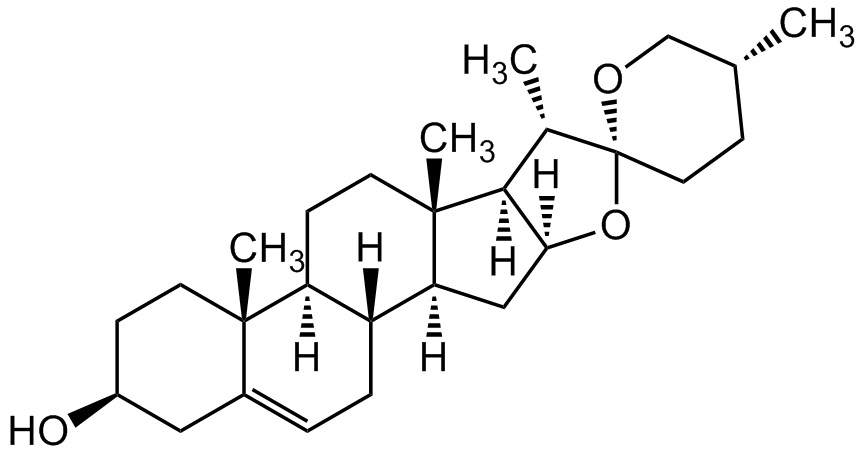Diosgenin
Product Code:
CDX-D0536
CDX-D0536
Host Type:
Plant
Plant
Regulatory Status:
RUO
RUO
Shipping:
AMBIENT
AMBIENT
Storage:
Short Term: +20°C, Long Term: +4°C
Short Term: +20°C, Long Term: +4°C
No additional charges, what you see is what you pay! *
| Code | Size | Price |
|---|
| CDX-D0536-G025 | 25 g | £96.00 |
Quantity:
| CDX-D0536-G100 | 100 g | £194.00 |
Quantity:
Prices exclude any Taxes / VAT
Stay in control of your spending. These prices have no additional charges, not even shipping!
* Rare exceptions are clearly labelled (only 0.14% of items!).
* Rare exceptions are clearly labelled (only 0.14% of items!).
Multibuy discounts available! Contact us to find what you can save.
This product comes from: Switzerland.
Typical lead time: 7-10 working days.
Contact us for more accurate information.
Typical lead time: 7-10 working days.
Contact us for more accurate information.
- Further Information
- Documents
- References
- Show All
Further Information
Alternate Names/Synonyms:
Nitogenin; (25R)-5-Spirosten-3beta-ol; 3beta-Hydroxy-5-spirostene
Appearance:
White to off-white powder.
CAS:
512-04-9
EClass:
32160000
Form (Short):
liquid
Handling Advice:
Protect from light and moisture.
InChi:
InChI=1S/C27H42O3/c1-16-7-12-27(29-15-16)17(2)24-23(30-27)14-22-20-6-5-18-13-19(28)8-10-25(18,3)21(20)9-11-26(22,24)4/h5,16-17,19-24,28H,6-15H2,1-4H3/t16-,17+,19+,20-,21+,22+,23+,24+,25+,26+,27-/m1/s1
InChiKey:
WQLVFSAGQJTQCK-VKROHFNGSA-N
Long Description:
Chemical. CAS: 512-04-9. Formula: C27H42O3. MW: 414.62. Diosgenin, a well-known steroid sapogenin derived from plants, has been used as a starting material for commercial synthesis of cortisone, pregnenolone, progesterone, and other steroid products. Diosgenin has shown many pharmacological activities. It exhibits anticancer, hypocholesterolemic, anti-diabetic, neuroprotective, immunomodulatory, anti-inflammatory, estrogenic, and skin protective effects. This is mainly by inducing apoptosis, suppressing malignant transformation, decreasing oxidative stress, preventing inflammatory events, promoting cellular differentiation/proliferation, and regulating T-cell immune response. It interferes with cell death pathways and their regulators to induce apoptosis. Diosgenin antagonizes tumor metastasis by modulating epithelial-mesenchymal transition and actin cytoskeleton to change cellular motility, suppressing degradation of matrix barrier, and inhibiting angiogenesis. Diosgenin has also been reported to reverse multi-drug resistance in cancer cells and sensitize cancer cells to standard chemotherapy. Additionally, diosgenin improves antioxidant status and inhibits lipid peroxidation. Its anti-inflammatory activity is through inhibiting production of pro-inflammatory cytokines, enzymes and adhesion molecules. Furthermore, diosgenin drives cellular growth/differentiation through the estrogen receptor (ER) cascade and transcriptional factor PPARgamma. Diosgenin has also be used to synthesize steroidal drugs. Several novel diosgenin analogs and nano-formulations have been synthesized with improved anti-cancer efficacy and pharmacokinetic profile.
MDL:
MFCD00016887
Molecular Formula:
C27H42O3
Molecular Weight:
414.62
Package Type:
Vial
Product Description:
Diosgenin, a well-known steroid sapogenin derived from plants, has been used as a starting material for commercial synthesis of cortisone, pregnenolone, progesterone, and other steroid products. Diosgenin has shown many pharmacological activities. It exhibits anticancer, hypocholesterolemic, anti-diabetic, neuroprotective, immunomodulatory, anti-inflammatory, estrogenic, and skin protective effects. This is mainly by inducing apoptosis, suppressing malignant transformation, decreasing oxidative stress, preventing inflammatory events, promoting cellular differentiation/proliferation, and regulating T-cell immune response. It interferes with cell death pathways and their regulators to induce apoptosis. Diosgenin antagonizes tumor metastasis by modulating epithelial-mesenchymal transition and actin cytoskeleton to change cellular motility, suppressing degradation of matrix barrier, and inhibiting angiogenesis. Diosgenin has also been reported to reverse multi-drug resistance in cancer cells and sensitize cancer cells to standard chemotherapy. Additionally, diosgenin improves antioxidant status and inhibits lipid peroxidation. Its anti-inflammatory activity is through inhibiting production of pro-inflammatory cytokines, enzymes and adhesion molecules. Furthermore, diosgenin drives cellular growth/differentiation through the estrogen receptor (ER) cascade and transcriptional factor PPARgamma. Diosgenin has also be used to synthesize steroidal drugs. Several novel diosgenin analogs and nano-formulations have been synthesized with improved anti-cancer efficacy and pharmacokinetic profile.
Purity:
>98% (HPLC)
SMILES:
C[C@@H](CO1)CC[C@@]21O[C@@]3([H])C[C@@]4([H])[C@]5([H])CC=C6C[C@@H](O)CC[C@]6(C)[C@@]5([H])CC[C@]4(C)[C@@]3([H])[C@@H]2C
Solubility Chemicals:
Soluble in ethanol (10mg/ml) or methanol. Insoluble in water or DMSO (both <1 mg/ml).
Source / Host:
Plant
Transportation:
Non-hazardous
UNSPSC Category:
Natural Products/Extracts
UNSPSC Number:
12352200
Use & Stability:
Stable for at least 2 years after receipt when stored at +4°C.
Documents
References
(1) M.A. Juarez-Oropeza, et al.; Int. J. Biochem. 19, 679 (1987) | (2) R. Hou, et al.; Acta Pharmacol. Sin. 25, 1077 (2004) | (3) I.S. Son, et al.; Biosci. Biotechnol. Biochem. 71, 3063 (2007) | (4) Y. Tada, et al.; Steroids 74, 504 (2009) | (5) T. Uemura, et al.; Mol. Nutr. Food Res. 54, 1596 (2010) | (6) Y.J. Wang, et al.; J. Nat. Prod. 74, 580 (2011) | (7) Z. He, et al.; Nat. Prod. Res. 26, 2243 (2012) | (8) C. Tohda, et al.; Sci. Rep. 2, 535 (2012) | (9) L. Wang, et al.; Int. J. Clin. Exp. Pathol. 8, 4830 (2015) | (10) S. Selim & S. Al Jaouni; Nat. Prod. Res. 30, 1830 (2016) | (11) Y. Chen, et al.; Chin. J. Nat. Med. 13, 578 (2015) (Review) | (12) G. Sethi, et al.; Nutrients 10, E645 (2018) (Review) | (13) M. Dong, et al.; Cell Death Dis. 9, 1039 (2018) | (14) Q. Gan, et al.; J. Steroid Biochem. Mol. Biol. 198, 105575 (2019) (Review)



